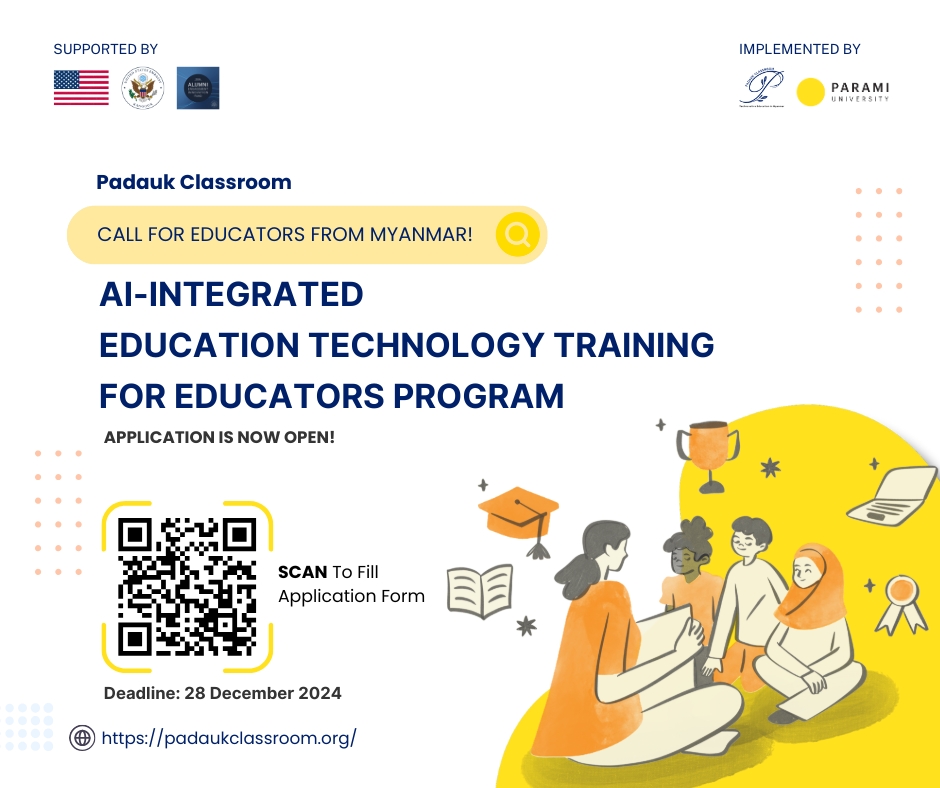
AI-Integrated Education Technology Training for Educators
This program is designed for educators who want to improve their skills in using Education Technology (Ed-Tech) and Artificial Intelligence (AI) tools in the classroom. Through lectures and hands-on activities, participants will gain practical knowledge and techniques to integrate these tools into their teaching effectively.
Topics:
• The Evolving Role of Technology in Education
• Historical Perspective of Technology in Learning
• Current Trends and Innovations
• Digital Literacy and its Importance
Discussion:
• Reflect on personal experiences with technology in education.
• Explore the impact of digital literacy on students.
Hands-on Activity:
• Research and present a case study on a notable educational technology innovation.
Assessment:
• Develop a concept map illustrating the interconnected aspects of educational technology. (Tool:
Padlet)
Topics:
• Components of a Digital Classroom
• Tools and Technologies for Classroom Management
• Blended Learning Models
• Establishing a Positive Digital Learning Environment
Discussion:
• Share experiences in implementing blended learning.
• Discuss the challenges and benefits of a digital classroom.
Assessment:
• Design a virtual classroom layout and organize learning resources. (Tool: Google Classroom)
Topics:
• Overview of Educational Technology Tools
• Introduction to Bloom Taxonomy
• Learning Management Systems (LMS)
• Collaboration Tools
• Assessment and Feedback Tools
Discussion:
• Explore the impact of various tools on teaching and learning.
Hands-on Activity:
• Evaluate and compare different educational technology tools.
• Categorize educational technology tools according to the Bloom’s Taxonomy domains.
Assessment:
• Develop a toolkit for teachers on selecting the right tools based on teaching objectives. (Backward
EdTech Tools)
Topics:
• Pedagogical Approaches in Online Teaching
• Facilitating Engaging Virtual Discussions
• Active Learning Strategies in an Online Environment
• Addressing Challenges in Online Teaching
Practical Examples:
• Showcasing successful online teaching strategies.
Hands-on Activity:
• Create a sample lesson plan for an online class.
Assessment:
• Develop an online teaching portfolio with interactive elements.
Topics:
• Designing Inclusive Digital Learning Activities
• Universal Design Principles
• Alternative Formats
• Accessibility Features in Educational Technology
Tips and Best Practices:
• Strategies for designing inclusive activities.
Hands-on Activity:
• Revise an existing lesson plan to make it more inclusive.
Assessment:
• Inclusive Design Portfolio showcasing inclusive practices in the digital classroom.
Topics:
• Strategies for Assessing Online Learning
• Utilizing Learning Analytics
• Online Assessment Tools
• Ensuring Academic Integrity in Online Assessments
Practical Examples:
• Demonstrating effective online assessment methods.
Assessment:
• Design a sample assessment aligned with learning objectives.
Topics:
- Managing Virtual Classrooms Effectively
- Fostering Online Etiquette and Netiquette
- Addressing Technical Issues in Real-Time
- Building a Collaborative Online Community
Best Practices:
- Strategies for effective digital classroom management.
Hands-on Activity:
- Simulate and resolve common technical issues in a virtual classroom.
Assessment:
- Develop a guide for students on online etiquette.
Topics:
- Introduction to Moodle:
- Overview of Moodle as an open-source Learning Management System.
- Key features and benefits for educators and students.
- Creating and Managing Courses:
- Steps to create a new course in Moodle.
- Adding resources and activities to enhance the learning experience.
- Engaging Students with Interactive Content:
- Exploring various activity modules available in Moodle (forums, quizzes, assignments).
- Incorporating multimedia and interactive elements.
- Managing User Roles and Permissions:
- Understanding different user roles in Moodle (teacher, student, administrator).
- Assigning roles and setting permissions for effective course management.
- Monitoring and Assessing Student Progress:
- Utilizing Moodle’s tracking and reporting features.
- Assessing student performance through gradebooks and analytics.
- Communication and Collaboration Tools:
- Exploring communication features such as forums and messaging.
- Facilitating collaboration through group activities and discussions.
- Administrative Functions and Site Maintenance:
- Overview of administrative tasks for Moodle site administrators.
- Best practices for site maintenance, backups, and updates.
Hands-on Activity:
- Moodle Course Creation:
- Educators will create a sample course in Moodle, adding resources, activities, and interactive content.
Assessment:
- Design a Fully Functional Course:
- Educators will design a comprehensive Moodle course, incorporating diverse activities and assessments.
- Emphasis on creating an engaging and interactive learning experience for students.
Topics:
• Understanding Artificial Intelligence (AI)
• Applications of AI in Various Fields
• Ethical Considerations in AI
Hands-on Activity:
• Exploring AI-powered tools and applications
• Discussing ethical implications of AI
Assessment:
• Write a reflection essay on the potential impact of AI on education.
